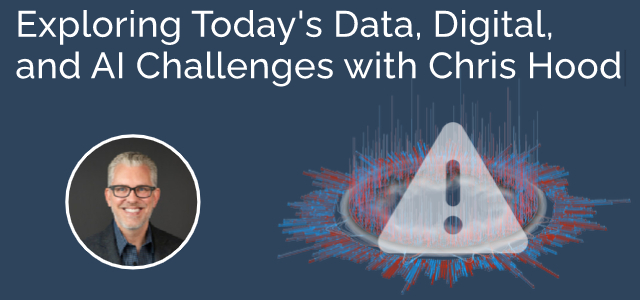Exploring Today’s Data, Digital, and AI Challenges with Chris Hood
Estimated reading time: 6 minutes
Chris Hood, former Google head of digital business strategy, the author of the new book Customer Transformation, and the host of the Chris Hood Digital Show was a recent guest on the Ad Victoriam “Salesforce Simplified” podcast. He discussed the data, digital, and AI challenges businesses face today. Here are some highlights from the conversation.
Why It’s So Difficult for Companies to Manage Their Data
Chris started by asking this question:
“How much data do you think is in the world?
“As of 2021, there are 79 zeta bytes of data, and that number is expected to double by 2025. So that’s 100 and 60 zeta bytes of data.
“So in the classic Marty McFly, Back to the Future, what the hell is a zettabyte?
“And if we were to think about this, I have a phone here in my hand; it has one terabyte of storage on it. Now that’s just storage; it’s not even completely full. But if we were to take 1,000,000,000 terabyte mobile phones that would store one zettabyte of data. And so if we think about that, that’s 79 billion phones. And then of course, by 2025 that’s 100 and 60,000,000,000 terabyte phones. That would be the equivalent of giving every person in the entire world 21 terabyte mobile devices. That’s a lot of data.”
Well, your head may be spinning after all those numbers (ours were), but to expound upon his point, Chris added, “And so when we start thinking about how do we deal with this, it’s not just the size and the amount of data. It’s also all of these new formats that we’re dealing with.
“We’ve got the online, you know, basic text, we got multimedia, we got all of the metadata from videos. We’ve got new forms of data like artificial intelligence and analytics. We are even starting to see multisensory types of data. This is obviously critical in the health field industries.
“But how do we track the data of something like smell? Those types of data are all increasing.
“And then, of course, we also have the regulatory issues, privacy concerns, and data security issues.
“All of these factors are just, you know, creating complex situations for us in terms of how to manage it. And that, I mean, those three things alone is why it’s very difficult for companies to manage the data.”
How Companies Can Be More Effective Managing Their Data
Chris outlined a few points to heed here…
“You’ve got to start thinking about moving your data to the cloud and I’m sure we’ll, we can get into that a little bit more.
“There’s probably a lot of different opinions about moving data to the cloud, but really you’re going to be safer, the whole purpose of being able to scale, you know, going from 79 zettabytes to 100 over the next three years, you’re gonna have to be able to scale and you can do that more successfully in the cloud.
“The other area is to start leveraging technologies, foundational technologies to help you manage data like APIs (Application Programming Interfaces).
“APIs are not just about creating experiences directly inside of an application or building applications that can connect with each other, those integration points.
“Obviously, it’s in the name, but it is also about helping you better manage that data across the cloud and across different platforms.”
He added, “And then begin thinking about how you’re governing that data.
“What are your internal policies to help you track, manage, and ensure that data is protected where the data is coming from? Those governance policies can be automated. Just defining what those governance policies are and building teams that wrap around those policies are going to be critical for the management of it.”
Getting Data Integration Right
On this topic, Chris drove home the point that proper data integration is pivotal for anything you’re doing, from accurate analytics or streamlining your operation to consistent customer experiences across all of your platforms.
He added, “The biggest one though, I think, is that customer experience piece. You know, we think about personalization as an example. It’s critical today. Everybody wants something that’s personalized, but you probably don’t want to personalize an experience for Sam that says, ‘Hello Paul,’ right? I mean, that’s where we’re at and this integration ensures that you’re getting proper data delivered to proper places when it’s needed.
“And it also helps drive innovation and partnerships.
“So when we think about all of those customer experiences, the ability to innovate and get to market faster and deliver those new experiences to customers that demand those experiences from you all happen within integration. That’s the customer first now.
“There’s other areas of integration across multiple platforms. When you start thinking about internal pro processes like human resources and marketing and building analytics and sharing that data across different teams so that they can see how things are working.
“But I would argue that the biggest opportunity for data integration is ultimately always going to be your customer first. And then secondary is understanding how those integrations and data management is going to help you improve operations, but you’re only improving operations to satisfy customer needs.”
How Generative AI is Fitting Into Businesses Today
Before diving headlong into this subject, Chris thought it important to give a reality check.
“We’re actually seeing a decline right now in overall AI usage. I think we’ve gotten past the hype, right? So obviously big hype, shiny new object, let’s use it.
“And we are seeing a decline, we see a decline in user subscriptions for open AI for ChatGPT as an example. I think we’re getting more settled into what is AI and what is not AI. The perspective out there for a lot of people is that they have this vision of what AI is.
“But that vision or even definition of what AI is is probably still 10 years away from today. We’re nowhere close to being able to do the things that I think people believe or it’s been hyped to do.
“And so that’s why you’re starting to see a decline in usage of AI.
“That doesn’t mean that no one’s talking about it clearly, it’s everywhere we see the government starting to take an active interest in it. We see a lot of companies trying to figure out how to use it.”
There is much more from Chris on the subject of AI, and data and digital challenges businesses face today. Listen to the entire podcast here.
How AdVic Can Help
Is your business in need of an AI solution? No worries, because the AdVic® AI team has the skills and expertise needed to get you up and running quickly so you can drive efficiencies and new revenue. Let’s explore your options and start creating your roadmap to success today!
Related Resources:
Why Forecasting Sales with AI is Important for All Industries
How to Improve Sales Forecasting in Salesforce with AI
Turn Sales Into Selling Machines, CRMs, AI, and More
Subscribe to the AdVic Salesforce Blog on Feedly:



